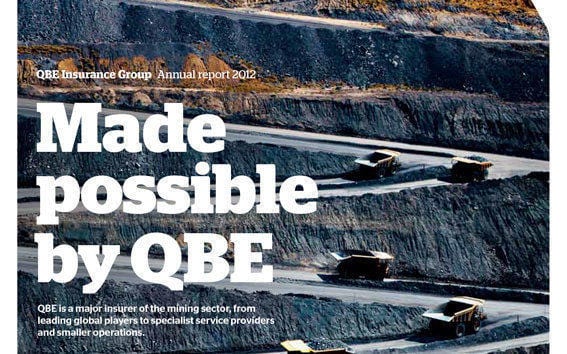Climate change is “one of the greatest challenges in the long term wellbeing of the global economy… We are doing more around managing climate change risks than ever before but could we, as an industry and as a society, do more? Undoubtedly.”
 So said QBE Group CEO John Neal in an opinion piece penned last month. The sentiment is in stark contrast to only four years ago, when QBE was so proud of its role in the fossil fuels sector the front cover of its annual report featured an image of a coal mine adorned with the slogan ‘Made possible by QBE’ (see image below).
So said QBE Group CEO John Neal in an opinion piece penned last month. The sentiment is in stark contrast to only four years ago, when QBE was so proud of its role in the fossil fuels sector the front cover of its annual report featured an image of a coal mine adorned with the slogan ‘Made possible by QBE’ (see image below).
Sadly, while the rhetoric has shifted, QBE’s operations tell a very different tale.
Unlike the big four Australian banks and 195 countries party to the 2015 Paris climate agreement, QBE does not even acknowledge the world needs to stay below 2 degrees of warming above pre-industrial levels.

It does, however, earn revenue from the fossil fuel industry of somewhere between $350-400 million per year, according to conservative estimates from Market Forces. Though, just how significant the sector is to QBE’s bottom line is unclear, as Energy is wrapped up with Marine and Aviation in its reporting.
You could say, as QBE has already, that it makes the fossil fuel industry possible. In fact, underwriting new exploratory drilling even ensures its further expansion.
While QBE claims to incorporate environmental risks in its approach to underwriting, this clearly does not preclude helping the fossil fuel industry worsen climate change. Nor does it seem to adequately consider the massive risks of oil spills, or the pollution of land, air and water from unconventional gas and coal mining.
QBE also asserts it is an active investor in green bonds, but doesn’t disclose the value of these investments. In all likelihood, the amount QBE invests in green bonds is dwarfed by its investments infrastructure and debt and equity of fossil fuel companies.
Moreover, climate change goes beyond a question of ethics, or lack thereof. It cuts to the heart of insurance business, because, like general insurers the world over, QBE is having to adjust to more frequent and more costly natural disasters, many of which are driven by climate change.
Large risk and catastrophe claims cost the firm US$1.35 billion, a significant drop from the US$2.35 billion paid out in disaster-ridden 2011, but well above QBE’s long term average prior to 2010. These included a “spate of large individual energy risk claims” suffered by its European Operations in the first half of 2015.
Major payouts for recent weather events include US$144 million for UK storms Desmond, Eva and Frank in late 2015, US$108 million for Cyclone Pam in March 2016 and US$76 million for NSW east coast storms in April.
Shareholders will have the opportunity to interrogate this information at the company’s AGM this week. And before long, it won’t just be shareholders. QBE subsidiaries will soon be required to disclose their investments in fossil fuels to the Bank of England and the California Insurance Commissioner.
APRA, who regulate the Australian insurance industry, have proven themselves slow off the mark in addressing climate risk, having so far not produced any research, nor spoken publicly on the systemic impacts of climate change on the insurance industry.
Unlike its peers IAG and Suncorp, QBE will be forced by foreign regulators to consider and act on the implications of climate change. APRA should demand the same level of disclosure QBE will soon provide in the UK and the US, and extend it to other major insurers.
In general, Australian insurers are lagging behind their European peers. AXA and Allianz have already divested their investment portfolios from thermal coal. Reinsurers Swiss Re and Munich Re have published extensive research on the impacts of climate change, and are attempting to shift the industry in the right direction.
At its AGM in Sydney, QBE will be confronted head on with its high-wire hypocrisy. And simply rolling out the old drug-dealers defence that ‘if we don’t do it, someone else will,’ just won’t cut the mustard. We need leadership from firms that can exert as much influence over the fossil fuel industry as QBE.
No amount of greenwash will sufficiently address climate change or the inherent risk it poses to their investment portfolios.
The reality is, should QBE choose to act, it is in a unique and powerful position to genuinely combat climate change and safeguard its own business. But to do so, it must take serious action internally, come clean on its investments, and advocate publicly for comprehensive policy change.
Daniel Gocher is a market analysts and researcher at Market Forces, and a former senior business analyst at QBE Insurance










